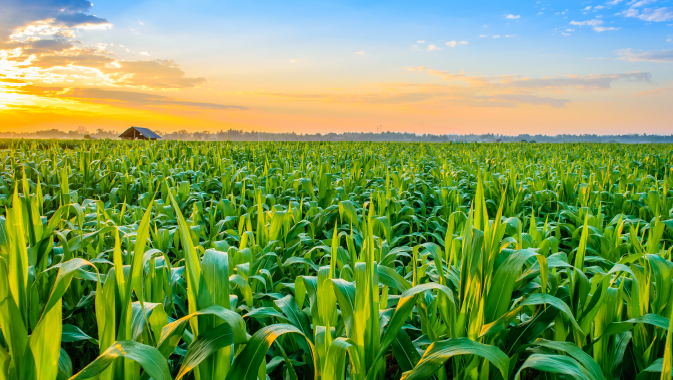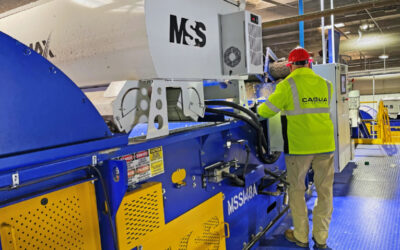Midwestern BioAg is a well-renowned manufacturer and distributor of specialty fertilizers. The company was built upon the knowledge and research of one of its founders, Gary Zimmer, whose books have affirmed him as a respected authority on the subject of biological farming. The second edition of The Biological Farmer was co-published in 2016 with Leilani Zimmer-Durand, who also co-wrote Advancing Biological Farming with Zimmer in 2011.
~
Biological farming works together with nature to create ideal growing conditions. Whether it is the soil composition, the chemistry or biology, animal and crop nutrition, or in ways to make crops more resilient and lessen the reliance on chemicals, it is a balanced approach to farming that produces exceptional results.
The six principles of biological farming are test and balance soils and ensure crops are fed a balance of all minerals, use fertilizers with optimal efficiency and that feed soil life as well as crops, use pesticides and herbicides only when absolutely necessary, create maximum plant diversity by using cover crops and diverse crop rotations, manage the decay of organic materials, as well as the balance of air and water in the soil through managed tillage, and feed the soil carbon from compost, green and livestock manures and crop residues.
“This education model essentially allows us to empower the farmer to know why they are making the decisions they are because there are lots of pieces on the farm that we can influence. We can’t just tell you what to do; it has to be a partnership,” said Chief Executive Officer Dr. Anthony Michaels.
The company, which is headquartered in Madison, Wisconsin, was established in 1983 and has expanded outward across the Midwestern United States with locations in Wisconsin, Minnesota, Iowa, Illinois, Indiana, Michigan, Ohio and South Dakota. From these locations, it has built relationships with upwards of 4,500 customers. It was the winner of the 2016 Rabobank Leaders in Sustainability award and the 2017 Wisconsin Innovation Award for Agriculture.
“For our pure custom solutions, we have ten facilities in the Upper Midwest, and our dealer network is primarily Upper Midwest. We’re in twenty-nine states total,” Dr. Michaels noted. “Some of our products travel pretty far. They are valuable enough that you can add shipping costs on and they are still cost-effective.”
Midwestern BioAg got its start in dairy nutrition, when Zimmer was looking at ways to advise farmers on diets for their animals that contained optimal nutritional content to minimize the need to feed supplemental minerals, vitamins and additional nutrient additives.
“What did cows do before these pills and potions? There was a time when a cow could be healthy on just grass alone, and what Gary was starting to see is something that is now widely accepted: over time, the nutritional content of crops has declined, and some of it had to do with plant genetics, and some of it had to do with soils being depleted,” said Dr. Michaels.
“He started looking at how he could make more nutritious feed. Animals and plants get their nutrition from the soil, so he looked into the soil and started exploring a variety of changes to rebuild the ability of a soil to provide nutrition to a crop. He essentially looked at the complete mix of things a farmer can do to improve the nutritional content of hay or grain, so more of the nutrition was in the crop.”
What he discovered was a way to produce greater yields of more nutritious crops that could, in turn, generate greater profits for farmers. Using what Dr. Michaels referred to as “dairy nutrition from the soil up,” the system’s approach to farming became the heart of the company.
“Gary found that advice alone was not enough – where does a farmer buy the products to execute on the new plan? He started by buying a truckload of fertilizer to share with a bunch of farmers that we were advising, and then he would buy another truckload and another truckload, and the next thing you know, we’re a fertilizer company,” Dr. Michaels joked.
Today, Midwestern BioAg enjoys a ninety-four percent returning customer rate. “We have wonderful customers. We build long-term relationships with each. This personal touch defined the company, but it’s a very slow way to growth, because you have to knock on every door and build a long-term friendship for each sale, but when you do, you have built your supply chain, and you have transformed the lives of the farmers that you work with,” Dr. Michaels noted.
Midwestern BioAg goes beyond the expected consideration of nitrogen, phosphorous and potassium (NPK) to include secondary and trace mineral analyses, plus the feeding of soil life to hold, cycle and deliver balanced mineral nutrition to the crop. Attention was paid to the inter-connected soil biology, chemistry, and physical structure to develop customized programs to meet crop specific needs, as well as advising its customers on what is required to produce greater yields from more robust crops.
Recently, the company built a new product line that combines many of its custom elements into a single, homogeneous platform. The product is called TerraNu™ and it combines organic matter with minerals and plant stimulants in a novel platform that enhances the performance of each part. The company and its partners, including FEECO International, Yargus and Prairie’s Edge Dairy, believe that this manufacturing process and product could revolutionize agriculture.
“It is a way to create value out of waste, in this case from large dairies. They make lots of manure, and we process it in a variety of ways to get it to be the right kind of material that feeds soil life. We blend it with a balanced mixture of NPK, calcium, sulfur and micronutrients in this homogenized granulated package that can be stored, transported and precision-applied,” explained Dr. Michaels.
Midwestern BioAg’s highly customized fertilizers and its innovative TerraNu offering both utilize nutrients more effectively to build healthy soil organic matter and improve crop resiliency. The result is more productive farmland and supply chains of healthy, nutritious food.
“We basically looked at a way to create a product line that simplified all the things that we do into something that a co-op or a traditional [agriculture] retailer could sell. Right now, our normal system is a customization for each individual farm. In order to help the farmer improve their soil and crop quality and their bottom line, we do absolute custom design on every field and every crop,” Dr. Michaels said.
“With our TerraNu products, we put an average prescription together, we built it around a carbon base, so we have a special way to feed microbes right where the minerals are dissolving,” he explained of the TerraNu product line. “And then we granulate it so it’s a precision fertilizer that can be blended with all other fertilizers in traditional fertilizer plants all over the country.”
TerraNu builds healthier, hardier soils that support more nutritious plants and animals that produce higher yields but result in less environmental damage and higher profits for the farmer. “It’s not as good as our custom program, but for any farmer that’s been deficient in those things, they get a nice immediate boost to the rest of their crops,” noted Dr. Michaels.
Midwestern BioAg teaches customers a more integrated way to farm using an approach that blends the best available tools to get the greatest outcomes. “If we could monetize the value of our advice, we could charge a lot of money, but people don’t pay for advice in agriculture; they pay for products. So we had to monetize what we do through specialized products that help execute on the system,” said Dr. Michaels.
Midwestern BioAg’s carefully formulated products are well-balanced and come in both dry and liquid forms to provide nutrition all season long. In addition to fertilizers, it provides custom animal nutrition, both grid and non-grid soil testing, fertilizer application, and forage and plant tissue analysis.
This attention to detail is why Midwestern BioAg has become the go-to resource for many farmers. Over thirty percent of its customers are organic producers, which has caught the attention of the major food producers that are increasingly focused on the organic market and the growing consumer demand for healthy and sustainable food products.
Its programs are specifically designed for organic operations; the products and its highly knowledgeable and professional staff can help farmers transition to high-production organic farming methods. “When you hear the stories about the organic farmers that have higher yields than the conventional average, those are often our customers,” Dr. Michaels explains.
“Many food companies are very interested in securing their supply chain, and as they grow the organic and natural side of their business, they are very interested in having traceability – having the ability to know which farm these things came from. They are also very interested in environmental metrics that go with it: a lower carbon footprint, reduced nutrient runoff, healthier soil, better biodiversity,” explained Dr. Michaels.
“By managing the nitrogen better – keeping it in biological form – we reduce the biggest contribution to the greenhouse gases. At the same time, by building the living parts of the soil, you build up organic matter which then stores carbon in the soil. So we end up with one to five tons of CO2 equivalents per acre, per year reductions in greenhouse gas emissions on farms.”
While the work is done on a farm-by-farm basis, the beneficial impacts to the environment have been great. “You paid for that fertilizer. Why on earth would you let it escape your farm? It should only leave your farm in a crop,” Dr. Michaels stated.
Looking to the future, Midwestern BioAg is identifying ways to communicate its value to the agriculture market more effectively. “There are all these folks that are comfortable with the way they have always farmed, and right now, they aren’t making a lot of money on these commoditized crops, and it’s hard. There’s a real challenge in agriculture overall, and I think our challenge is, how do we penetrate and change traditions?” explained Dr. Michaels.
Now that it has demonstrated the value it can bring to its customers, Midwestern BioAg has developed financing options for farmers to improve its options and access to those farmers who are interested in its programs to increase and even double their yields.
“Being able to change something as massive as the agricultural system and the food we eat – half of the land on the planet is used to produce food. We’re talking about one of the biggest drivers of biodiversity, and we’re talking about the very thing that sustains lives, and it’s exciting to know that there is a trajectory to make those things dramatically better, executing on a reasonable scale,” said Dr. Michaels.













